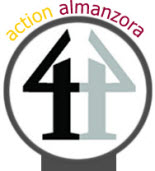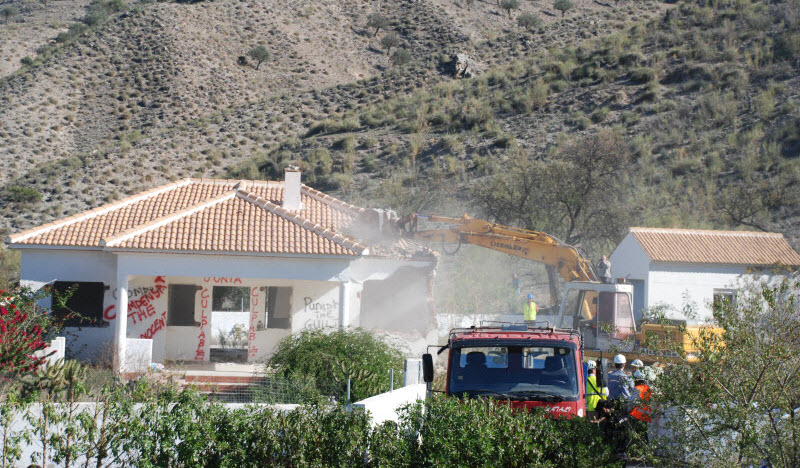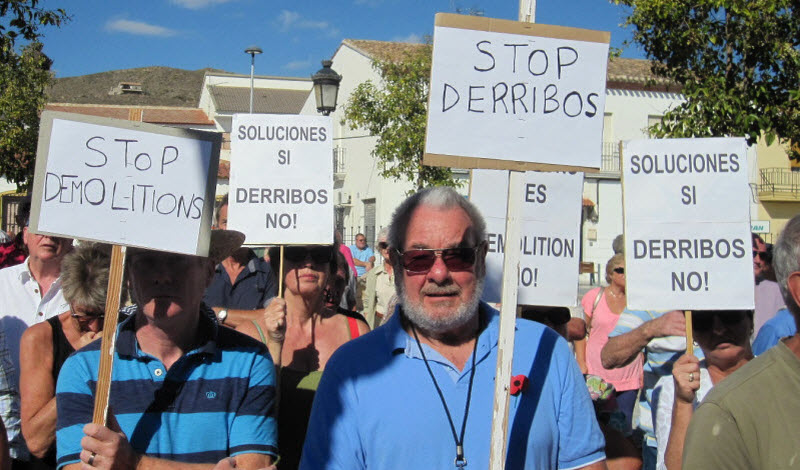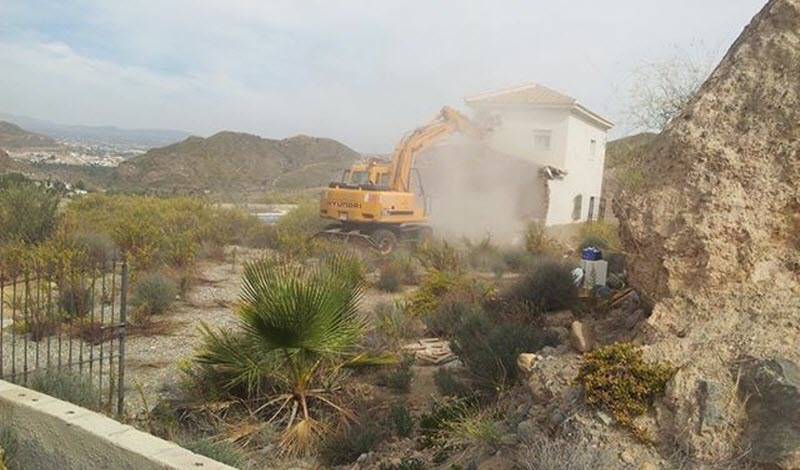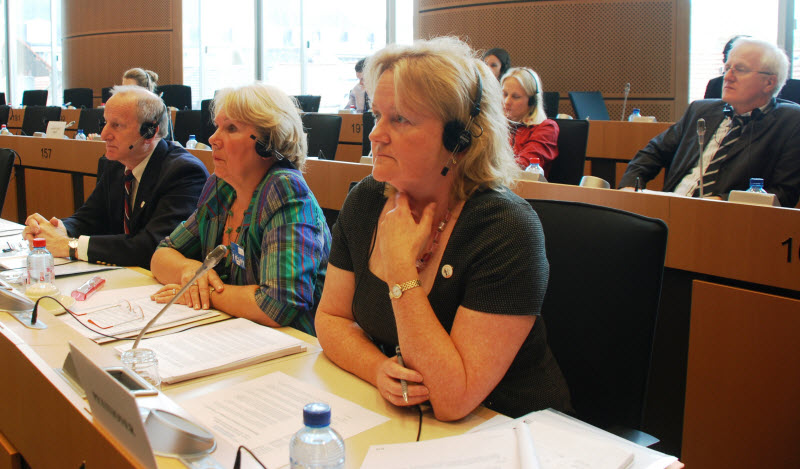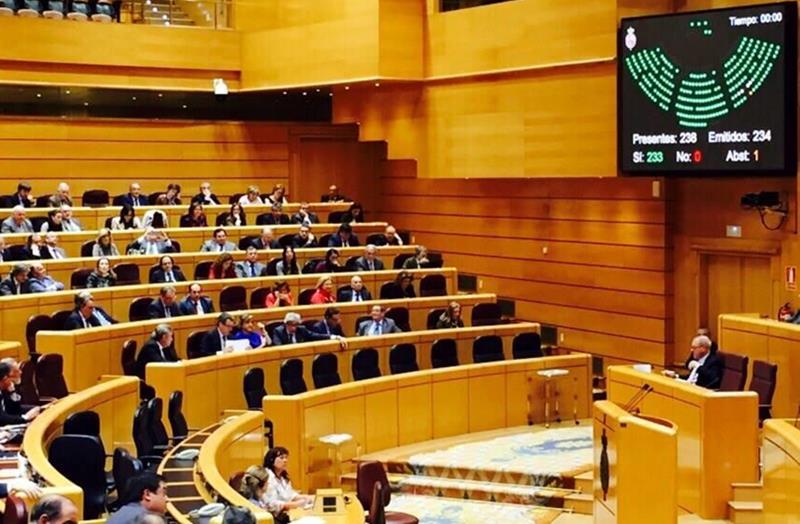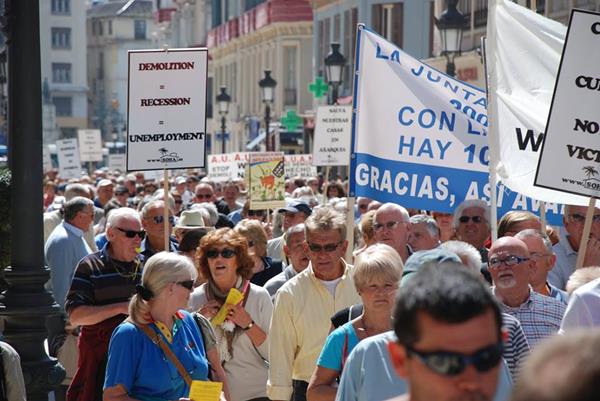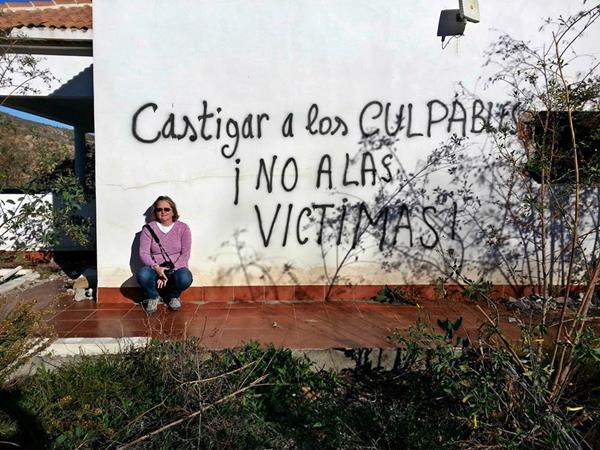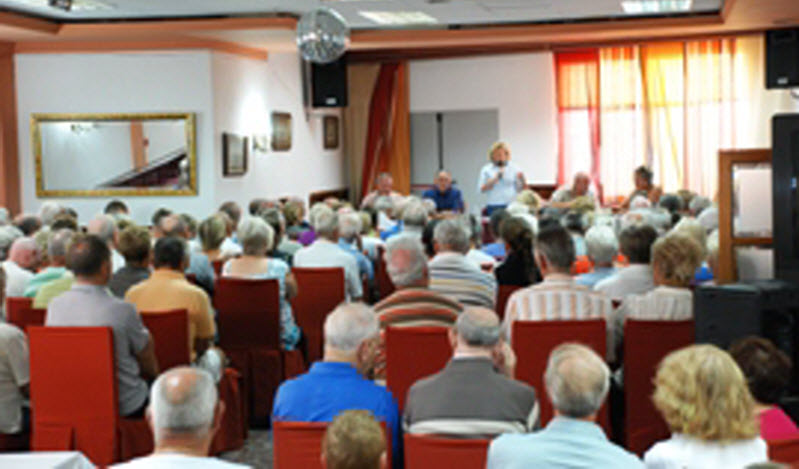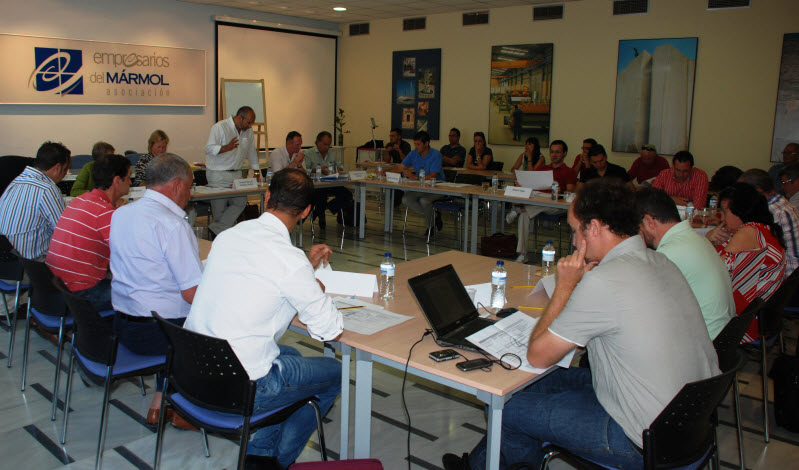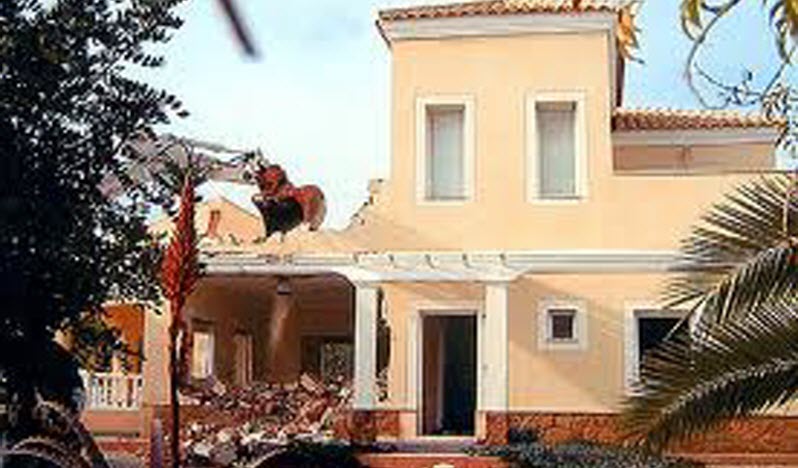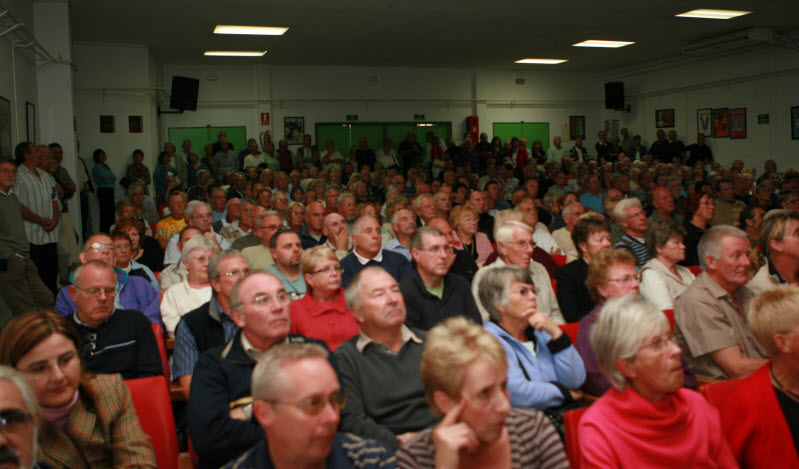Next Member's Meeting: ALL meetings cancelled until further notice
AUAN
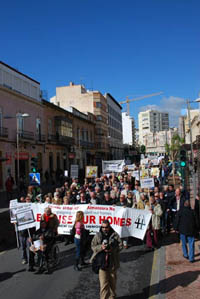 The
AUAN is a non-profit, non-political organisation campaigning to
bring about the legalisation of homes in Andalucía
currently considered to be "illegal".
The
AUAN is a non-profit, non-political organisation campaigning to
bring about the legalisation of homes in Andalucía
currently considered to be "illegal".
Our association originated in the Valley of Almanzora. According to figures published by the Junta de Andalucía there are 12,697 illegal constructions in the Valley of Almanzora. Many of these are homes purchased in good faith by European Citizens (the majority British) in the period from 2000-2006 when the valley witnessed an uncontrolled construction boom. Today many are without mains water and electricity. Many more have dubious electricity connections and lack a final habitation certificate.
The area is blighted as a consequence of the arrangements made between the then serving Town Hall officials and builders, to construct with building licences granted by the Town Hall but without authority from the regional government. Some developers were allowed to construct houses with inadequate building licences or no licence at all. During this period an estimated £100m+ was paid to developers by unsuspecting families, some with children and (the majority) of retirement age.
Our members bear witness to corruption and greed amongst government employees, builders, estate agents and the supporting professions (lawyers, architects etc) many of them in denial, but still in possession of massive sums of money obtained through their activities.
Our experience in the Almanzora Valley is a microcosm of problems throughout Andalucía where there is an estimated 300,000 illegal properties according to the regional government.
We are open to everyone in Andalucía who purchased their property in good faith, and now find themselves in a position of legal uncertainty.
We are federated to FAUN, the National Federation of Organisations against urban abuse.
Our objectives
 •
To bring about, as far as it is possible, the proper legalisation of land and houses in Andalucía that are
currently considered to be 'illegal' through collective representation to our councils, to the Central and Regional
Government in Spain and to Europe if necessary for remedies in this regard.
•
To bring about, as far as it is possible, the proper legalisation of land and houses in Andalucía that are
currently considered to be 'illegal' through collective representation to our councils, to the Central and Regional
Government in Spain and to Europe if necessary for remedies in this regard.
• To secure a proper supply of water and electricity from the relevant providers as a legal right.
• To prevent or mitigate, as far as possible, any potential 'land-grab' or infrastructure costs having to be borne by owners of properties where these should be borne by other parties i.e. property developers where owners had not been informed of the future potential expense.
• To inform, support, and where possible, advise our members on matters which commonly affect them in relation to the foregoing, as far as is practicable.
What do we want?
 We believe that the following changes
are necessary to resolve the problem and make sure that it doesn't happen again.
We believe that the following changes
are necessary to resolve the problem and make sure that it doesn't happen again.
Propuestas de AUAN (en Español)
1. PROPERTY ACQUIRED IN GOOD FAITH: In all cases of demolition of a property acquired in good faith by citizens, as a result of any administrative, contentious administrative or criminal proceedings, mechanisms must be established to ensure prior, real and effective compensation. Without prejudice to the previous statement, with regard to houses with licences belonging to owners who acted in good faith, these houses should only be demolished if there is an overriding public interest (areas of risk for example), and where no other alternative exists; otherwise such houses should be considered as assimilated to the regimen of 'fuera de ordenacion'. Citizens should not become victims of the maladministration of the state.
2. RECORD PROCEEDINGS IN THE PROPERTY REGISTER: The initiation and final outcome of any administrative or judicial review or file relating to urban discipline, the restoration of disturbed planning order, or relating to the annulment of licences or planning permissions should be inscribed in the Property Register. Failure to do so should oblige the responsible administration to indemnify the purchaser in good faith of the property for the damage and prejudice caused. This serves to promote legal certainty and prevent administrative neglect that results in prejudice to innocent third parties.
3. INSCRIPTION OF LIMITATIONS OF USE: As a statutory property right, any limitations or conditions which affect the use of land, or its ownership, for planning or environmental reasons should be the subject of inscription in the Property Register. Failure to do so should oblige the responsible administration to indemnify the purchaser in good faith for the damage and prejudice caused. The Register of Property should reflect reality. Over and above registration, the register should promote the principles of disclosure, the legal authority of the register, the protection of legal transactions and of inscribed rights.
4. EXPIRY OF ILLEGAL LAND PARCELS: The illegal creation of urban land parcels should be subject to the normal term of expiry established in article 185.1 of the LOUA and the inscription of the subdivision in the Property Register should be allowed. It goes against the constitutional principle of legal certainty not to set a time period in which the administration must act.
5. DUPLICATION AND LACK OF PROPORTIONALITY IN PROCEEDINGS: Administrative sanctions, which are currently disproportionate, should be tempered. A response via the penal route to an infraction should impede other courses of action. Submitting citizens to a series of different proceedings, added to the possibility of large fines, bankrupts the principle of proportionality.
6. EXTENSION OF THE REGIMEN OF ASSIMILATED TO 'FUERA DE ORDENACION': The status of assimilated to 'fuera de ordenacion' should be given to all houses, whether they are in settlements or scattered rural settlements, granting them a licence of first occupation even before the planning changes take place. The same should apply to houses in areas of special protection which were completed prior to the establishment of the protection and these houses should be subject to the same time limits established in article 185.1 of the LOUA. The concept of assimilation to 'fuera de ordenacion' is confusing in the 'Regularisation Decree', is inconsistent with case law on the subject and establishes a number of 'second class' houses.
7. SETTLEMENTS ON PROTECTED LAND; It should be possible to incorporate a settlement of houses into planning even when the settlement is on protected land, if these houses: are not in zones of public domain or natural risk; when there is no serious damage to the environment; when the environmental values which resulted in the protection no longer exist; and when the demolition of the houses does not serve to effectively restore those values, or when the reestablishment measures are too costly or disproportionate.
8. FACILITIES FOR INCORPORATION INTO PLANNING: It must be possible, via a change to the LOUA, to create areas of planning regularisation, with improved planning standards, cessions and equipment; to establish a regional fund with eligible activities relating to the management of these areas, and to provide aid (deferred payments, loan facilities etc) to families whose economic situation prevents them from meeting the costs of urbanisation without substantial prejudice to their families finances.
9. INFORMATION AND TRANSPARENCY: Planning proceedings or planning infractions should be communicated individually and effectively to those directly impacted by these proceedings, or to those who may be prejudiced by them. Electronic consultation (via the Internet) of planning and environmental documents, pending approval or approved, should be ensured and should be a prerequisite for their validity. The Catastro should agree with the Property Register in a real and effective way.
10. PROFESSIONALS INVOLVED IN REAL ESTATE TRANSACTIONS: Establish measures to ensure the protection of the consumer in the purchase and sale of real estate. Establish the requirement for professionals involved in the negotiation or management of property transactions to meet adequate standards in terms of ability, skill and knowledge. Necessitate proper qualifications and professional indemnity insurance. Establish standards of practice designed to avoid conflicts of interest.
11. PROMOTERS AND CONSTRUCTORS: Should be covered by adequate guarantees, insurances or sureties, to cover possible liability to third parties, the proof of same should be a requirement in order to operate.
12. ARBITRATIONS: An independent system of arbitration should be established to settle conflicts between citizens and the administration in matters relating to urban planning.
Our fears for the future
 1.
We are fearful that current actions, especially those relating to any fines; demands for infrastructure payments; and the
like; will lead to many home owners being put into a worse financial situation than they are in at present. This is already
leading to much stress and anxiety for our members and, of course, many others.
1.
We are fearful that current actions, especially those relating to any fines; demands for infrastructure payments; and the
like; will lead to many home owners being put into a worse financial situation than they are in at present. This is already
leading to much stress and anxiety for our members and, of course, many others.
2. We are fearful that this could also lead to many being forced to return to their homeland having lost their life savings because they cannot afford to legalise their home.
3. We fear that our constructors, our Town Halls, our architects and our lawyers will get away with what they have done because continents drift faster than a Spanish civil court case. A moot point anyway if you can’t afford to sue.
4. We are concerned that NEW areas of urbanisations will be included in some plans before the legalisation of properties already being occupied.
5. We believe that if the current plan of action continues without significant change many owners will not see a solution in their life-time. Under current Andalucian Planning Laws (LOUA) an urbanisation can only grow by a permitted amount over a certain period. This restriction has knowingly been far exceeded in many districts. Many owners will therefore not be made legal as authorities ‘hide’ behind this rule. The very one they broke in the first place! This law needs to be altered to allow for the existence of homes on rustic land for purposes not related to agriculture. You can imagine the constant fear and concern this brings when people see a distinct possibility that they will pass the problem and the possible financial burden on to their children.
6. We fear that we will be blamed and held responsible. In many cases home owners have been ‘duped’ into becoming a promoter of their property therefore liable to future infrastructure costs and any possible penalties (civil and criminal) that should have been the responsibility of the builders. We are already experiencing a problem where builders charge owners for various utilities and then fail to pay the supply company. Some owners have now been cut off from these services and asked to pay the outstanding charges or pay a large sum for re-connection.
7. We fear that we are seen as a ‘cash generator’ for our impoverished Councils. 50% of our members do not have access to mains water or electricity. Some local councils now require that the owners pay exorbitant amounts to be given permission to connect to these services.
8. We have no certainty! Some members have fully legalised documents for their property, now to be told that the Junta of Andalucía has withdrawn building licences for ‘irregularities’, in many cases court proceeding are being actioned. Their documents have official stamps from the very people that now take these actions.
9. We fear there is no justice! While many of our Human Rights have and continue to be abused, we know that we would struggle to see justice due to the slowness of Spain’s judicial system. While it would be our right to do so, it is a futile action and one that would probably take as long, if not longer, than the process they are currently taking. Many cannot afford it. To this extent we implore you to continue to seek, on our behalf, a fair and speedy solution.
10. We fear (with some justification) that we will be pilloried in the Spanish press, made scapegoats and portrayed as somehow complicit in the scandal of urban abuse. For example, an article in Teleprensa published 2nd September 2009 titled ‘Harsh attack by the British Community in Cantoria on the issue of illegal houses’ asserts that British residents knowingly purchased property on non urbanised land, made ‘black money’ payments to avoid Spanish tax, bought houses cheaply and most bizarrely of all, moved to Spain to take advantage of a free health care system.
11. We fear that our homes will be left in limbo, outside of any known planning regulation or ‘fuera de ordenacion’ with semi-legal status and simply left to return to the dust as a forgotten statistic of the Spanish planning scandal. We observe that this fear is already becoming a reality as the town plans emerge.

